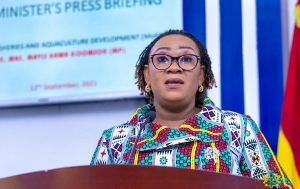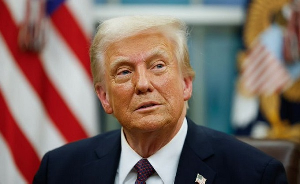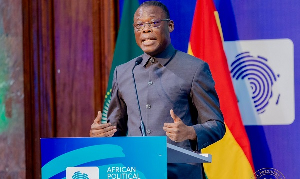Corruption is the biggest single problem that faces Ghana, and which places the tallest hurdle in the path of this nation’s economic progress and total independence. Every past military regime mentioned this menace as one of the main reasons for removing the administration they toppled. Scores of Ghanaians were either killed or severely punished by the two most ruthless regimes this country has ever had, AFRC and PNDC. In spite of those brutalities, corruption is still very high in the country; and it may keep Ghana backward forever, if it is not checked as soon as possible.
Why has corruption persisted for so long in Ghana, despite the heavy-handed tactics used by Rawlings and his AFRC or NDC members? The answer to this question, in my opinion, is because no effective method has ever been used to deal with corruption from “the centre of power”. By the “centre of power”, I mean the people who form the top brass of the public sector in Ghana, and who therefore possess governmental power in the country. This top brass of the public sector include the President, Ministers, other Presidential Appointees, Chief Executive Officers of public bodies, Members of Parliament, Judges, and Heads of the Security Services. This group of Ghanaians possesses such extensive executive and administrative power in the country that it gets difficult for the actions of its members to be controlled, should they become corrupt. The fact, though, is that the largest chunk of corruption in Ghana is perpetrated by this relatively small group of Ghanaians.
If this top brass is very corrupt, and there is no effective way of checking the group, then any effort to deal with corruption is bound to fail. Corruption at the “centre of power” has always been in Ghana, irrespective of whether the country is governed by the military or civilians. I suggest that we create within Government a Special Minister whose role should involve the handling of public accountability, probity and anti-corruption. I suggest further that this special role should be added to the responsibilities of the Chief of Staff whose pivotal position within the top hierarchy of the Government makes him or her fit to perform the role.
This Cabinet Minister who can be called the “Chief of Staff and Minister for Public Accountability, Probity and Anti-Corruption”, like the President under whom he works, should be a man of absolutely impeccable integrity. He should have power to keep eyes on, and control the actions of all members of the Government, as well as on all members of the governing party, to ensure that no member of the Government, or of the party in power can use his positions to enrich himself. The Chief of Staff and Minister for Public Accountability, Probity and Anti-Corruption should also have the power to internally investigate any allegation of corruption or any other financial impropriety made against any member of the Government; or against any other Presidential Appointees against whom any allegation of corruption or any other financial impropriety has been made; or against any Chief Executive Officer or any other Senior Executive Officer of any public body, institution or service against whom an allegation of corruption or any other financial impropriety has been made; except that, to ensure balance of power among the three arms of Government, the Chief of Staff and Minister for Public Accountability, Probity and Anti-Corruption should not have power to directly investigate the Speaker and Deputy Speaker of Parliament or the Chief Justice and other Justices of the Superior Courts of Judicature or the Auditor-General or the Chairman and Deputy Chairman of the Electoral Commission or the Commissioner for Human Rights and Administrative Justice.
While, as a result of ensuring balance of power, the Chief of Staff and Minister for Public Accountability, Probity and Anti-Corruption should not have direct investigative power over Parliament, the Judiciary and some of the special administrative bodies specified under article 71 of the 1992 Constitution, he should have power to write to the Head of the CID or to the Head of any other public investigative body to ask him to investigate the Speaker and Deputy Speaker of Parliament, the Chief Justice and other Justices of the Superior Courts of Judicature, the Auditor-General, the Chairman and Deputy Chairman of the Electoral Commission, and the Commissioner for Human Rights and Administrative Justice; and such public investigative Head should oblige.
Where corruption investigations made directly by the Chief of Staff and Minister for Public Accountability, Probity and Anti-Corruption or made indirectly through the Head of the CID or any other public investigative body show that there is sufficient evidence against a public official, the matter should be referred to an “Anti-Corruption and Other Financial Fraud Prevention Prosecution Agency”, which should be set up as part of the Government’s anti-corruption agenda, to prosecute the public official implicated in the investigation. The “Anti-Corruption and Other Financial Fraud Prevention Prosecution Agency” that should be formed must be made independent of the office of the Attorney General and Minister for Justice; and his appointment, powers and ranking within the public service hierarchy, etc, should be similar to those of the Commissioner for Human Rights and Administrative Justice, as stipulated under Chapter Eighteen of the 1992 Constitution.
For corruption and other financial impropriety to be eradicated, or at least minimised to a tolerable level in Ghana, there must be a President and a Vice President who possess hundred percent impeccable integrity; and who should not only be “clean”, like Dr Hilla Liman who died a complete destitute, but should, in addition, be “tough in action” and “uncompromising over principles”. They should NOT, in fact, allow their subordinates to run their Governments for them, just as either “clean and calm” Dr Hilla Liman or “His Holiness Asomdwiehene” Professor Atta Mills did during his relatively short period of administration. The President and the Vice should also be able to drawn in a few dependable Ghanaians with equally good records of impeccable integrity and incorruptibility to join them to form the yolk of the Executive team; and that should, at all cost, include someone who is fit to hold the pivotal position of Chief of Staff and Minister for Public Accountability, Probity and Anti-Corruption, the success of whose work will determine the overall success of the entire Government and that of the nation at large. This Executive team that should eradicate, or at least reduce corruption to a tolerable level is one that must treasure national and international honour and abhor financial greed. *THE TEAM SHOULD DEFINITELY EXCLUDE PEOPLE WHO HAVE BEEN [RIGHTLY] DESCRIBED AS “GREEDY BASTARDS” BY THE MAN SOME GHANAIANS PREVIOUSLY REFERRED TO AS “JUNIOR JESUS”, BUT WHOM OTHERS HAVE QUITE RECENTLY COME TO CALL “JUNIOR JUDAS”.
Otchere Darko
Opinions of Tuesday, 25 September 2012
Columnist: Darko, Otchere














